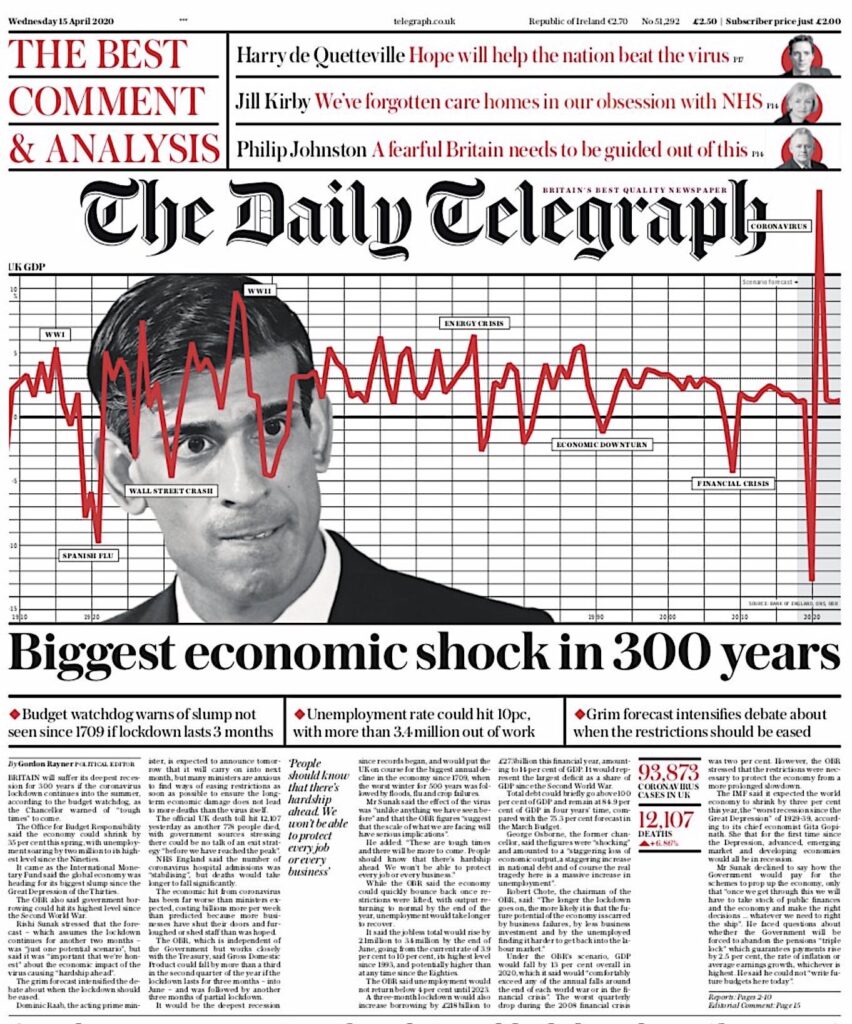
The Telegraph, like all the other broadsheets, leads with the OBR’s grim forecast – that the economy could shrink by 35% this spring if the lockdown continues for another two months. You can read the OBR’s analysis here.
We also learnt yesterday that two high street fashion chains are going into administration, Oasis and Warehouse. That follows last week’s news that Debenhams, with 22,000 employees, has filed for administration, as has Cath Kidson, putting 950 jobs at risk. The collapse of these employers – not to mention the third of small businesses likely to go bankrupt if the lockdown continues – will have a cost in terms of loss of life. Yesterday, a reader alerted me to an interesting 2009 paper estimating the impact of mass redundancies on mortality by looking at job losses in Pennsylvania in the 1970s and 80s and then tracking those workers via Social Security Administration death records. The authors’ concluded that being made redundant at the age of 40 results in a reduction in life expectancy of 1 to 1.5 years. You can read that paper here.
Another reader sent me a link to an excellent source of data for lockdown sceptics called ‘Facts about COVID-19’. If you click here, you’ll be taken to the latest update. Among the new studies it mentions is a pre-print by John Ioannidis and colleagues at Stanford estimating that your chances of dying from COVID-19 if you’re <65 is about the same as the risk of being killed in a road traffic accident. They point out that people <65 years who don’t have any underlying predisposing conditions account for only 0.3%, 0.7%, and 1.8% of all COVID-19 deaths in Netherlands, Italy, and New York City. You can read that paper here. Another interesting paper the site links to is the serological study carried out by Hendrik Streeck, director of Institut für Virologie at Bonn University, in which he tested a representative sample of 1,000 people in the north-western town of Gangelt, one of the epicentres of the outbreak in Germany. He found that 2% of the population currently has the virus and 14% were carrying antibodies and concluded that 15% of the town had been infected. By looking at the number of fatalities in the town, Streek estimated that the infection fatality rate is 0.37%, about ten times lower than the original WHO estimate. You can read a German write-up of that study here, and a summary by Ross Clark in the Spectator here. I’ve added a link to ‘Facts about COVID-19’ on the Introduction page.
The other big news yesterday was Donald Trump’s announcement that the US would stop funding the WHO because it has “failed in its basic duty” in response to the coronavirus crisis. (The US gave the WHO $400 million in 2019.) The WHO has not covered itself in glory since the beginning of the outbreak, in part because it has shown itself too willing to toe the Chinese Communist party’s line. I’m thinking in particular of its infamous tweet on January 14th:
But that’s just the tip of the iceberg. At the end of January, the WHO declared that travel restrictions were not necessary to contain the spread of the virus – and it’s worth recalling that China imposed a travel ban on air travel from Hubei to other parts of China on January 23rd but not from Hubei to the rest of the world. Tedros Adhanom Ghebreyesus, the director general of the WHO, effusively praised the Chinese authorities for their response to the virus, even though that included locking up those doctors who first raised the alarm, and, once they admitted they had a problem, forcibly detaining in hospitals all those who’d tested positive for the virus in Wuhan, whether they required hospital care or not, and imprisoning in their homes all those who’d tested negative. The WHO also issued inconsistent advice about face masks, which likely led to public confusion. And then there was the interview a Hong Kong broadcaster did on March 28th with Bruce Aylward, the WHO’s assistant-director general, in which he was refused to answer questions about why the WHO has locked Taiwan out of the membership:
This crisis has inevitably led to calls for the transfer of even more power from independent sovereign states to unelected international organisations, like the EU, the UN, etc., such as this piece by Yuval Noah Harari in the FT. But if the behaviour of the WHO is anything to go by – not to mention the failures of the EU – this experience has taught us precisely the opposite lesson.
Keep sending links to interesting blog posts to me at realtobyyoung@gmail.com and keep posting comments, including critical ones. This site is only one day old, but already it has racked up over 30,000 page views.












To join in with the discussion please make a donation to The Daily Sceptic.
Profanity and abuse will be removed and may lead to a permanent ban.